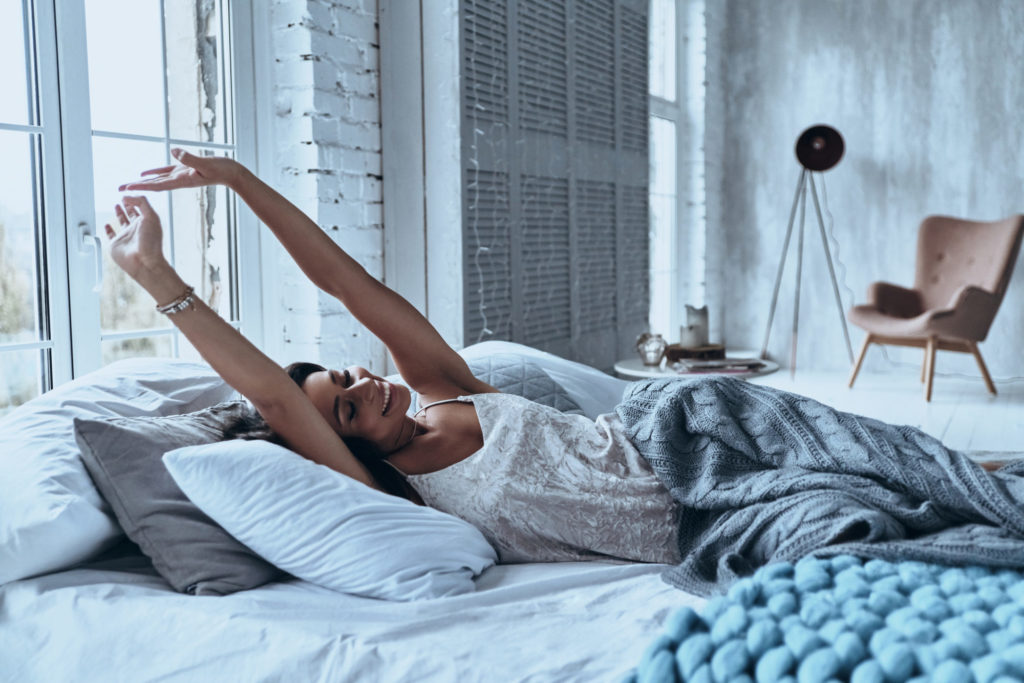Have you noticed there is a lot of talk about sleep? The habit we all share is becoming a commodity and to put it quite simply, we are not getting enough of it. We look at how we regard and talk about sleep and why we should make it a priority for better health.
Have you noticed there is a lot of talk about sleep? The habit we all share is becoming a commodity and to put it quite simply, we are not getting enough of it. We look at how we regard and talk about sleep and why we should make it a priority for better health.
Are You Prioritising Sleep For Better Health?
Sustainable Living | 6th December 2019 by Sarah Myers

Ditch those old sayings
We are all familiar with old sayings like “sleep is for the weak”, “sleep is overrated” and “no rest for the wicked”. All give less credence to the idea that sleep is essential and puts to bed (apologies for the pun!) the idea we actually need sleep more than we know.
This psyche has crept into everyday life, particularly when you match it with the idea that there are not enough hours to do what what we need to do. Our lives are so packed these days, there is good reason to say we don’t have enough daylight hours to tick off everything on our to-do list.
Equally, spending more time in bed getting some much needed zzz’s hardly resonates with advice to be as active as time allows. Getting the right number of bedtime hours jars with the importance of keeping active and mobile meaning finding a balance can be difficult.
How we talk about sleep
When it comes to sleep, we only seem to talk of it in terms of how little we get, how early we get up or how late we went to bed. We don’t really talk about the great sleep we had the night before lasting eight hours or more and feeling all the better for it.
Sleeping for more than eight hours when we need to, will to many sound like far too much, be a waste of time and may even be perceived as a sign of laziness and weakness. Ever heard someone saying, “life is so short, why spend it in bed?”.
The reality
All of these things chip away at the stark reality that the majority of us just aren’t getting enough sleep.
We function better after a good night’s sleep and in the back of our minds we have known for a long time we need sleep in order to stay healthy. We learn this at a young age and anyone who is parent to a child knows if they have not been sleeping well they are potentially more susceptible to illness, can be more irritable and prone to mood swings.
As adults, a lack of sleep can be a contributing factor in developing heart disease, diabetes, high blood pressure, suffering a stroke and weight gain. We seem to be fairly familiar with the risks of not getting enough sleep, yet very often we still function with less than the recommended amount.
Do we underestimate the importance of sleep?
It’s not unfair to say we may underestimate how importanta night of good sleep is and the extent to which sleep contributes to our overall health. Perhaps because we can carry on for some time without serious health manifestations becoming apparent.
Or, if we do experience health issues, we do not naturally think a lack of sleep could be one of the reasons why. Understanding and differentiating between the causes and consequences of a lack of sleep do not appear to be straightforward.
Sleep is challenged by digital living
Today our sleep/life balance is fast paced where achieving harmony between both is becoming more challenging. We find ourselves getting less sleep not only because of our busy and hectic lifestyles but also because of our apparent permanent connection to the online world. The digital age we live in is proving to be a distracting force and one of the factors preventing a good night’s sleep.
A study by Deloitte found 1 in 3 people in the UK check their phones during the night for anything ranging from checking the time, reading messages or browsing the news. The same research also found that the younger the person, the likelihood of checking a phone increases with 50% of 18-24 year olds saying they used their phone during the night. As a result, easy access to and the reliance on technology is proving disruptive to natural sleep rhythms and can actually impact the body’s ability to fall asleep in the first place.
Just how important is sleep for overall health?
Sleep is linked to lifespan
We are finding out more about the link between sleep and lifespan. Getting the right amount of sleep each night is not only associated with a longer lifespan, but with other health benefits including improved memory and productivity, weight management and strengthening our immune system.
It is more important than ever before
Getting more sleep and an uninterrupted one at that is by far more important today than it has ever been before – probably because things have gone so far the other way! With more of us not sleeping for the recommended 7-8 hours, staying up later and getting up earlier means shorter and disrupted sleep is commonplace.
We now find ourselves in a situation where getting the optimum amount of 7-8 hours is now becoming a luxury as more brands respond to consumers in pursuit of better quality sleep.

Who’s talking about it?
Matthew Walker – Neurologist Matthew Walker is a sleep expert and one who believes us to be in the middle of a “catastrophic sleep-loss epidemic”. His findings point towards links between sleep deprivation and illnesses like Alzheimer’s and cancer as well as a variety of mental health problems. He also equates sleep loss to a £30bn loss to the UK economy each year. Walker believes that the UK sleep problem isn’t being properly addressed mainly because sleep is not encouraged in order to deal with a raft of health issues.
Michael Breus – Michael Breus, also known as The Sleep Doctor is a clinical psychologist who specialises in sleep disorders. He like Walker believes that sleep is hugely important to our health. He recognises that living in a world with a lot of unnatural light and a desire to do everything and be with everyone is not conducive to a good night’s sleep. Understanding why we need more sleep is key to making it happen according to Breus.
Health problems associated with a lack of sleep

Is there good news for solos?
A recent 2018 survey of 2000 people in the US by Amerisleep (a mattress company), found solos get more sleep compared to people in relationships. Solos came out top with 7.13 hours of sleep per night.
While this is good news, it is generally thought the quality and length of a person’s sleep is much dependent on one’s individual circumstances and experiences. It’s safe to say the jury is still out on this one, as much of the research we found seems contradictory as to whether or not sleeping solo means getting more or a better quality sleep.
The future
Whether the true impact of sleep will ever be fully understood remains to be seen although the argument for instilling better sleep opportunities for us all is strong and is being taken more seriously. Treating the core problem instead of the symptom and understanding which is which is really what needs to happen and for Walker and others like him, this is just the beginning of the major sea change that is required to improve sleep habits today.
The main takeaway here is – prioritise sleep and do what you can to get your 7-8 hours. Every. Single. Night!
More from Solo Living
The Most Important Relationship Is The One You Have With Yourself
Share this post:
Hear from Solo Living now and then by signing up to our mailing list


















